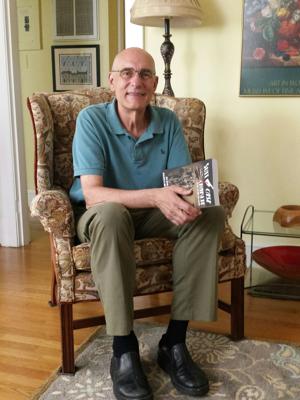A Novel Born of Childhood Nightmares
BY SUSAN ELZEY
Special to the
Register & Bee
Danville novelist and poet John
Guzlowski didn’t have to look far for the inspiration for his latest novel
“Suitcase Charlie.” The story was as close as his childhood nightmares.
“We’d laugh, play tag and
hide-and-go-seek, climb on fences, play softball in the nearby park, go to the
corner store for an ice cream cone or a chocolate soda. You name it,” Guzlowski
recalled. “This was the mid-50s at the height of the baby boom, and there were
millions of us kids outside living large and — as my dad liked to say — running
around like wild goats.”
He and his family lived in the
working-class neighborhood of Chicago called “Humboldt Park” or the “Polish
Triangle.” A lot of his neighbors were Holocaust survivors, and Guzlowski and
his friends grew up with the residual fear and anger of their parents, plus the
stories of their parents, all around them.
Guzlowski’s parents had been slave
laborers in Nazi Germany. His mother spent more than two years in forced labor
camps, and his father spent four years in Buchenwald Concentration Camp.
Guzlowski was born in a refugee camp in Germany after World War II and came
with his parents, Jan and Tekla, and sister, Donna, to the U.S. as displaced
persons in 1951.
Three
boys murdered
Carefree, that is until the bodies
of three young Chicago boys were found in a shallow ditch after they had seen a
matinee in downtown Chicago.
“Everything changed,” Guzlowski
said. “For the first time, we kids felt the kind of fear outside the house we
had seen inside the house. It shook us up. Where before we hung out on the
street corners and played games till late in the evening, now we came home when
the first street lights came on … The street wasn’t the safe place it once had
been.”
Guzlowski and his friends began
watching for the killer of the boys and even gave him a name — “Suitcase
Charlie” — and imagined that he carried around a suitcase in which he could
haul dead children. Then as the evening shadows fell, a boy would inevitable
look down the street, point and whisper, “Suitcase Charlie?”
It was enough to send the boys
heading for home.
The memories of the murders that
happened when he was 7 stayed with Guzlowski, even if his novel is not about
the murders of those three boys.
His
novel
“The first murder in the novel is
discovered about seven months after those murders. So the detectives in my
novel worry that it may be the same killer,” Guzlowski explained. “They talk
about how the investigation of the Suitcase Charlie murders is or isn’t like the
earlier investigation. Also, people in the neighborhood of the killings wonder
about a connection.”
The summary of the novel on Amazon
reads as follows:
“On a quiet street corner in a
working-class neighborhood of Holocaust survivors and refugees, the body of a
little schoolboy is found in a suitcase.
“The grisly crime is handed over to
two detectives who carry their own personal burdens, Hank Purcell, a married
WWII veteran, and his partner, a wise-cracking Jewish cop who loves trouble as
much as he loves the bottle.
“Their investigation leads them
through the dark corners and mean streets of Chicago — as more and more
suitcases begin appearing. Based on the Schuessler-Peterson murders that
terrorized Chicago in the 1950s.”
Remembering
the Holocaust
He considers “Suitcase Charlie,”
which has some graphic descriptions of violence, an “extension of the horrors
of the Holocaust.”
The Holocaust has been at the heart
of most of Guzlowski’s writing. His book of poetry, “Third Winter of War:
Buchenwald,” was nominated for the Pulitzer Prize in Poetry in 2007.
“The killer chooses the area because
these people have seen the terrible things that happened during the Holocaust,”
he said.
After he wrote his first book,
“Language of Mules,” Guzlowski’s friend told him that Guzlowski must be “all
Holocausted out,” but that has not been the case. In fact, he a collection of
new poems and short prose pieces he has written in the past 10 years about his
parents that will soon be published by Aquila Polonica, a publishing house that
specializes in publishing works about the Polish World War II experience.
He has recently started writing
science fiction, however, and published a flash fiction post-apocalyptic story.
Selling
‘Suitcase Charlie’
He is also focused on selling
“Suitcase Charlie,” which is available on Amazon.com in both a print edition and
Kindle edition.
What he enjoyed most about writing
the book, though, was revisiting his childhood.
“I enjoyed revisiting all the places
I grew up in,” he said. “The novel begin on the corner of Evergreen Street in
my neighborhood. It was an opportunity for me to revisit Chicago and re-imagine
all the buildings. The cops are interviewing people I knew. It was so much fun
for me.”
Elzey is a freelance writer for the Danville Register & Bee. She can be reached at susanelzey@yahoo.com.
BY SUSAN ELZEY
Special to the Register & Bee


No comments:
Post a Comment